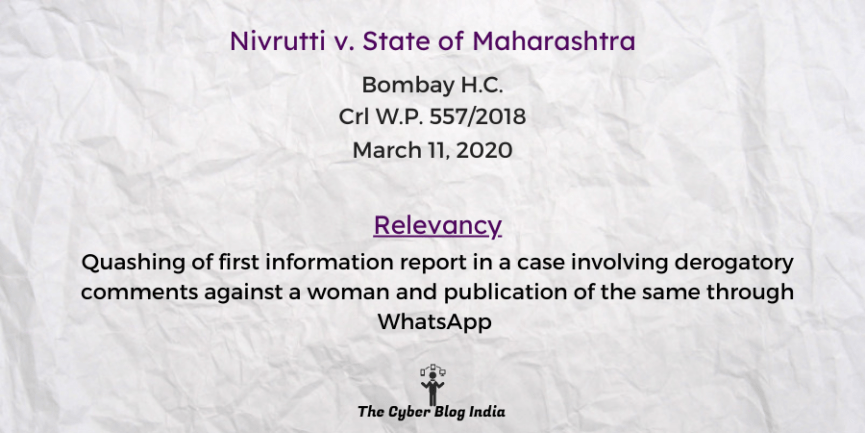Nivrutti v. State of Maharashtra

Nivrutti v. State of Maharashtra
(2020) 2 AIR Bom R (Cri) 762
In the High Court of Bombay
Crl W.P. 557/2018
Before Justice T.V. Nalawade and Justice M.G. Sewlikar
Decided on March 11, 2020
Relevancy of the case: Quashing of first information report in a case involving derogatory comments against a woman and publication of the same through WhatsApp
Statutes and Provisions Involved
- The Information Technology Act, 2000 (Section (2)(w), 67, 67A, 79)
- The Indian Penal Code, 1860 (Section 294, 500, 506, 507, 509)
- The Constitution of India, 1950 (Article 226, 227)
- The Code of Criminal Procedure, 1973 (Section 482)
Relevant Facts of the Case
- The petitioner and the respondent were married but the petitioner did not treat the respondent well.
- He would beat her, use derogatory words for her, and would say that she earned money through her business of prostitution.
- It was alleged that the petitioner married the respondent under pressure as he was a homosexual.
- Further, the petitioner also sent WhatsApp messages to the respondent calling her a prostitute.
- The petitioner even used to call their relatives and derogate his wife.
- The respondent aggrieved with this filed a first information report.
Prominent Arguments by the Advocates
- The petitioner’s counsel submitted that WhatsApp messages could not be called public space and hence would not attract Section 294 of the Indian Penal Code, 1860. The learned counsel further stated that the words were not sent to a WhatsApp group.
- The respondent’s counsel argued that there was a transmission of obscene words in the WhatsApp account which would amount to a public place, hence falling within the purview of Section 294 of the Indian Penal Code, 1860.
Opinion of the Bench
- The Court highlighted WhatsApp Security and cited available literature regarding the same. WhatsApp messages are end-to-end encrypted and provide a unique lock and key. The messages or WhatsApp calls cannot be seen by any other person except the person who receives the message or the call.
- It was also established that WhatsApp works on end-to-end encryption, where only the sender and the receiver of the message can read the same. Not even WhatsApp is capable of reading the messages, hence WhatsApp cannot be called a public place and Section 294 of the Indian Penal Code, 1860 cannot be applied.
- The Court gave the prosecution to investigate the offence under Section 509 of the Indian Penal Code, 1860 as words used by the petitioner against the respondent amounts to insulting the modesty of a woman.
Final Decision
- Application disposed of.
- FIR quashed to the extent of Section 294 of the Indian Penal Code, 1860.
